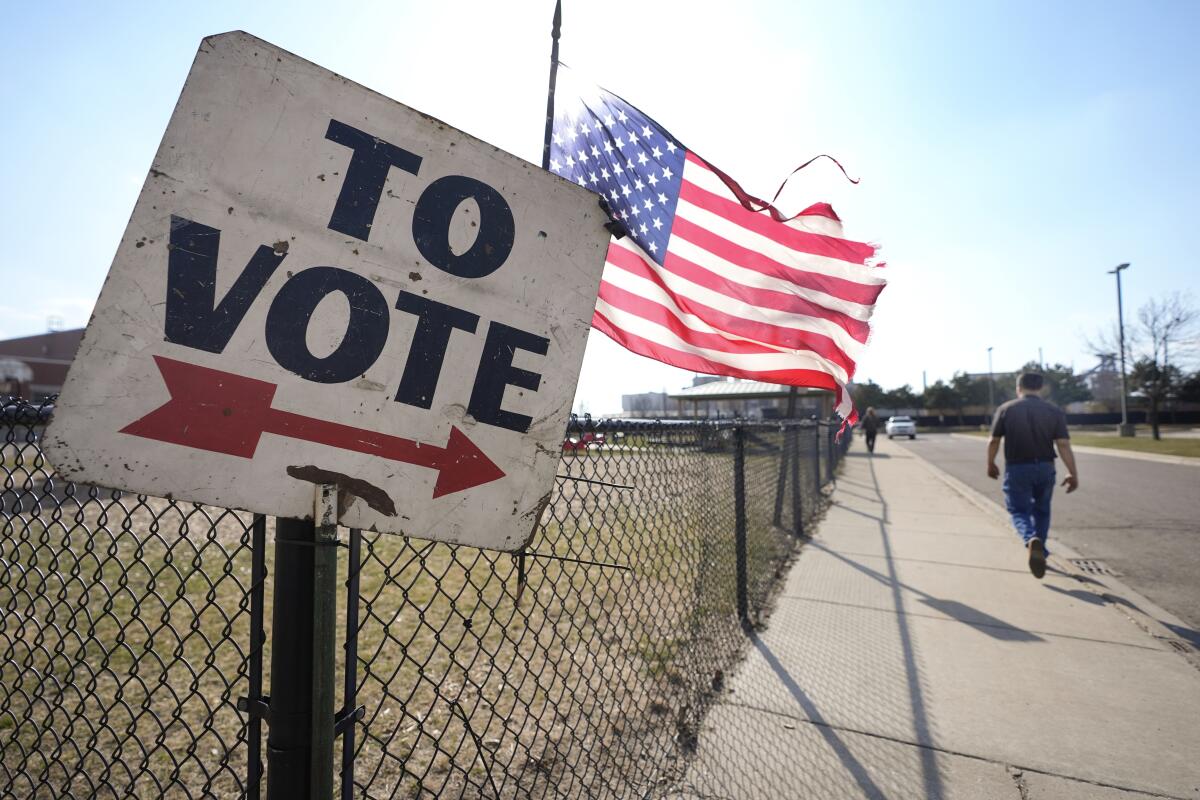Michigan takeaways: Big wins, but primary results show warning signs for Trump and Biden

- Share via
LANSING, Mich. — President Biden and Donald Trump easily won their parties’ primaries in Michigan on Tuesday, but the results showed that both candidates have cause for concern in their bid to win the swing state in November.
An “uncommitted” vote in Michigan’s Democratic primary was the first concrete indication of how backlash over Biden’s handling of the Israel-Hamas war in the Gaza Strip might impact his reelection campaign.
And although former President Trump won his primary by a large margin, support for GOP rival Nikki Haley once again showed that some Republican voters have misgivings about giving him another four years in office.
Here are some takeaways from Michigan:
Biden, Trump move closer to their party’s nomination
Michigan was the last major primary state before Super Tuesday, and both sides were watching closely for implications for the November general election in one of the few genuine swing states left in the country.
Biden has now cruised to victories over lesser known candidates in South Carolina, Nevada and in New Hampshire, which he won in a write-in campaign. Tuesday’s results show that his standing is still strong in Michigan, which Biden returned to the Democratic column in 2020.
Trump has swept all five of the early state contests, including South Carolina, the home state of rival Haley. He now heads into Super Tuesday, when 15 states and one territory hold Republican nominating contests, as the overwhelming favorite to lock up the Republican nomination.
Michigan was one of three so-called blue wall states, including Wisconsin and Pennsylvania, that Trump won in 2016. He predicted a big win beforehand.
Just 16 of Michigan’s 55 Republican presidential delegates will be determined by the primary results, while the remaining delegates will be allocated during a March 2 convention. Trump’s anticipated dominance at the state convention, where grassroots activists will play a key role, will decide the allocation of the remaining 39 GOP delegates.
Some Democrats show anger over Gaza with ‘uncommitted’ vote
Home to the largest concentration of Arab Americans in the nation, Michigan has become the focal point of Democratic frustration over the White House’s response to the war that has left some 30,000 Palestinians dead in Gaza.
Teenage friends Angelina, who is Palestinian, and Adar, who is Jewish Israeli, talk about the Hamas attacks on Israel and Israel’s war on Gaza. ‘It’s OK to disagree.’
Anger over the issue was clear on Tuesday as some voters marked “uncommitted” on their ballots in the Democratic primary. Biden still dominated the vote, but the final result could be a concern in a state he won by less than 3% in 2020 and probably can’t afford to lose.
Organizers of the “uncommitted” movement had purposely kept expectations low, having only seriously begun their push a few weeks ago. The “Listen to Michigan” campaign that organized the push said they were hoping for 10,000 votes, pointing to Trump’s win of less than 11,000 votes in 2016 to show the significance of that number.
When President Obama ran for reelection in 2012, the last time a Democratic presidential incumbent sought reelection, the “uncommitted” option received close to 21,000 votes — or 11 percentage points. Slightly more than 13% voted “uncommitted” on Tuesday.
The “uncommitted” vote totals would need to be between 20 and 30 percentage points for Democrats to worry about their impact in November, said Richard Czuba, a pollster who has long tracked Michigan politics.
With family trapped in Gaza, two Palestinian friends in the West Bank hold each other up amid crushing grief.
“Twenty percent gets my attention. If it rises to 25%, that gets a lot more attention, and if it rises above 30%, I think that’s a signal that Joe Biden has pretty substantial issues in his base,” Czuba said.
Much of the “uncommitted” vote was expected to come from the east side of the state, in communities such as Dearborn and Hamtramck, where Arab Americans make up close to half of the population. Biden defeated Trump in Dearborn by a roughly 3-to-1 advantage in 2020 and Hamtramck by a 5-to-1 margin.
Some Republicans still oppose Trump
Despite Trump’s clear victory, Haley saw significant support from the swing state’s Republicans, winning more than 26% of the party vote.
Some of her best results came in Oakland and Kent counties, where Democrats have been gaining ground in recent years, contributing to their recent statewide success. She also performed better in Washtenaw and Ingham counties, where the state’s largest universities are located.
Trump has dominated in primaries with help from his base, but his strength among likely voters in the general election remains unclear. Haley only began campaigning in Michigan over the weekend, while Trump has made regular appearances in the state over the last eight years.
AP VoteCast indicates that much of the opposition to Trump in the Republican primaries has come from voters who abandoned him before this year.
All three statewide Republican candidates whom Trump endorsed in the 2022 midterms were crushed by Democratic incumbents.
More to Read
Get the L.A. Times Politics newsletter
Deeply reported insights into legislation, politics and policy from Sacramento, Washington and beyond. In your inbox twice per week.
You may occasionally receive promotional content from the Los Angeles Times.












